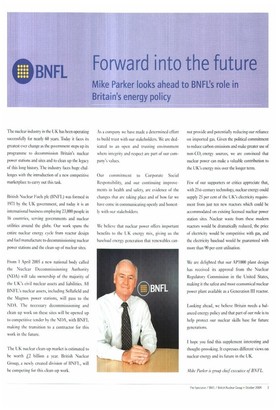BNFL Forward into the futur
Mike Parker looks ahead to BNFL's role in Britain's energy policy
The nuclear industry in the UK has been operating successfully for nearly 60 years. Today it faces its greatest ever change as the government steps up its programme to demmmission Britain's nuclear power stations and sites and to clean up the legacy of this long history. The industry faces huge challenges with the introduction of a new competitive marketplace to awry out this task.
British Nuclear Fuels plc (IINFL) was formed in 1971 by the UK government, and today it is an international business employing 23,000 people in 16 countries, serving governments and nuclear utilities around the globe. Our work spans the entire nuclear energy cycle from reactor design and fuel manufacture to decommissioning nuclear power stations and the clean-up of nuclear sites.
From 1 April 2005 a new national body called the Nuclear Decommissioning Authority (NDA) will take ownership of the majority of the UK's civil nuclear assets and liabilities. All BNFL's nuclear assets, including Sellafield and the Magnox power stations, will pass to the NDA. The necessary decommissioning and clean-up work on these sites will be opened up to competitive tender by the NI 3A, with BNFI, making the transition to a contractor for this work in the future.
The UK nuclear clean-up market is estimated to be worth L2 billion a year. British Nuclear Group, a newly created division of IINFI., will be competing for this clean-up work. As a company we have made a determined effort to build trust with our stakeholders. We are dedicated to an open and trusting environment where integrity and respect are part of our company's values.
Our commitment to Corporate Social Responsibility, and our continuing improvements in health and safety, are evidence of the changes that are taking place and of how far we have come in communicating openly and honestly with our stakeholders.
We believe that nuclear power offers important benefits to the UK energy mix, giving us the baseload energy generation that renewables not provide and potentially reducing our reliance on imported gas. Given the political commitment to reduce carbon emissions and make greater use of non-CO, energy sources, we are convinced that nuclear power can make a valuable contribution to the UK's energy mix over the longer term.
Few of our supporters or critics appreciate that, with 21st-century technology, nuclear energy could supply 25 per cent of the UK's electricity requirement from just ten new reactors which amid be accommodated on existing licensed nuclear power station sites. Nuclear waste from these modern reactors would be dramatically reduced, the price of electricity would be competitive with gas, and the electricity baseload would be guaranteed with more than 90 per cent utilisation.
We are delighted that our A P1000 plant design has received its approval from the Nuclear Regulatory Commission in the United States, making it the safest and most economical nuclear power plant available as a Generation III reactor.
Looking ahead, we believe Britain needs a balanced energy policy and that part of our role is to help protect our nuclear skills base for future generations.
I hope you find this supplement interesting and thought-provoking. It expresses different views on nuclear energy and its future in the UK.
Mike Parker is group chief executive of BNIE.


















































































































 Previous page
Previous page